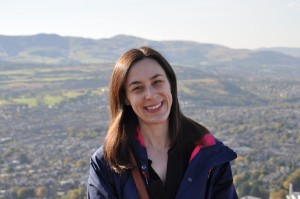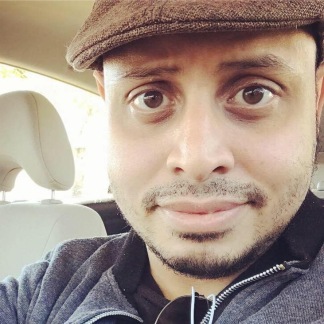It was called a mille-feuille, the last cake she made for me. The layered cake of sugar and cocoa and almonds, the one she made for my fourteenth birthday, tasted like air, like nothing, as she withered into her own dust of a skeleton, cells relentlessly dividing from the inside, lumping together into masses on her knuckles, her knees, and her hips. The growths poked out like ganglions and she winced with every step taken, every fist made. She sat on the reclined La-ZBoy chair, her papery eyelids closed, the lashes had already fallen out. Her breath made a wheezing noise, like when I blew hard into a kazoo for my eleventh birthday.
Six months after my thirteenth birthday, when the drops of blood appeared in the lining of my underwear and when the blood appeared in the sink of her vanity, her face changed. The whites of her eyes, like beautiful porcelain, were now red and brown, burst capillaries spoiling the good china. It began with a radiating heat, from the crown of her head to the inside of her ear canal, the lymph nodes swollen. Cluster headaches paralyzed the right half, and pain emanated from within her brain to the back of her pooled eyes.
She told me, but I already knew. Dad was out for a drive. It was evening. The sun was setting. Lavender smeared across the blush sky, pink and purple swirled into beautiful, custard clouds. Wisps floated away, like specters moving off to distant lands. She was at the threshold of my room. I was doing yoga on my worn mat, inhaling to reach, exhaling to expand, stretching upwards vertebrae by vertebrae. She spoke the word “cancer,” which I traced on my forearm in loops and lines. She collapsed as the sun made its final descent.
A whisper descended onto the house, a perpetual hour extended into hushes. Dad sighed as he left rooms, a short intake of oxygen and a long breath out. It was the same breath she used to growl out when she shifted from down dog to forward fold, knees bent forgivingly, shoulders pulled away from her pink ears. She bowed and pressed her hands, praying back the health. Yoga didn’t help; neither did the aromatherapy nor the acupuncture nor the chemo nor the surgery. For a while it was sedatives, so her nights could stretch out. She woke up screaming, forgetting she was riddled with tumours. Then nothing kept her eyes closed through the pain. Dad snored on the couch downstairs.
So I massaged her.
I knelt beside the chair and pressed gently into her hands, kneading them like she kneaded the bread dough when she was well. I knew where the pressure points were, which knuckle was the most sensitive. I worked around them, rubbing my beds of my fingers into the hardened shells of the tumours in her hands. First the index, then the middle finger, then the ring finger, and finally, the pinky finger. The thumb I couldn’t touch. It remained in a crooked stance, frozen bent, flexing for a fist or something more. If I kneaded her hands, transference of my life to hers could be made. Maybe my love could cure these hardened abnormalities.
A spell fell over the air, a magic held. On the legs was where I could relax my pressure. I pushed my weight into the wasted muscles. I rubbed in circles and squares and triangles. She fell into a light sleep, her breathing slowed to the point where I brought my ear to her chest to make sure the lungs were inflating. I returned to her legs. Connect the dots–joints to femurs back to hips. I wrote words on her skin in cursive and coils–my name, her name, I love you, don’t die, please stay, one more cake please, tell me about my birth again, tell me how you named me, don’t die, not yet. I chanted a poem and traces lines of the runes. Their shapes and lines imbued with power to bring back the dying. I carved and coloured, so she will walk and talk. Writing those words into her body as a message, a plea, a prayer of grace to make her better. To flush the skin to its reddish hue, to place the varicose veins back into the circulatory system. I collected the words and carried them to her, but they were jumbled with other words invading in. I mixed them up with words like pain management, radiation, chemotherapy, handkerchief, wig, hospice, palliative. I chanted others like sugar, kiss, spoon, rose, caring, breakfast, daughter, mother, love, love, love.
I laid my head on her lap, a soft blanket laid across, as I migrated from knee to ankle, ankle to toe. The big toe was out of bounds territory, the worst of them all, worse than the thumbs. I detected the borders of the tumour, its bumpy skin visible through the invisible husk of a person. The tendons that fanned out from the spoke of her joint to the cusps of her toes were draped in the thinnest skin of all. The atlas of her veins was rubbery as I rubbed my fingertips over the vessels and nerves. I felt the sludge of the blood pulsing through.
She startled awake and moaned as I poured like milk flowed from a dirty cup to a clean glass. The muscles of her cheeks twitched as she tried to smile. I asked if she wanted me to make her anything to eat, I’d bake for her, her favourite, a honey cake with strawberries, but she shook her head. Three bent fingers combed through my hair and she weaved my hair into a braid, into layers like the cake she made for me, like strands of cocoa, like the glazing on top of a silken head, into a lasting act of love before she turned and made the final passing into the creamy clouds.
 Lauren Hummel is an emerging writer with an undergraduate degree in journalism from the University of Toronto. She earned a Masters of Arts degree with distinction in Creative and Critical Writing from the University of Gloucestershire. Her work has appeared or is forthcoming in the Evansville Review, Heritage: New Writing VIII anthology and For Women Who Roar magazine. She lives in Toronto, Canada.
Lauren Hummel is an emerging writer with an undergraduate degree in journalism from the University of Toronto. She earned a Masters of Arts degree with distinction in Creative and Critical Writing from the University of Gloucestershire. Her work has appeared or is forthcoming in the Evansville Review, Heritage: New Writing VIII anthology and For Women Who Roar magazine. She lives in Toronto, Canada.
 Joaquin Fernandez is a recovering filmmaker and South Florida native perpetually tinkering with his first novel. His work has appeared in Okay Donkey, Cotton Xenomorph, Cheap Pop, and Pidgeonholes among others. He’s guest edited special issues for Kissing Dynamite and X-R-A-Y Magazine in addition to editing for the Radix Media anthology AFTERMATH. He can be found on Twitter @Joaqertxranger and on his website
Joaquin Fernandez is a recovering filmmaker and South Florida native perpetually tinkering with his first novel. His work has appeared in Okay Donkey, Cotton Xenomorph, Cheap Pop, and Pidgeonholes among others. He’s guest edited special issues for Kissing Dynamite and X-R-A-Y Magazine in addition to editing for the Radix Media anthology AFTERMATH. He can be found on Twitter @Joaqertxranger and on his website  Elizabeth Horner Turner’s poems can be found or are forthcoming in Cutbank, Fairy Tale Review, Gulf Coast, Nightjar Review, and semicolon literary journal, among others. She’s been awarded a Tennessee Williams Scholarship to attend the Sewanee Writers’ Conference, and was selected as a Poetry Scholar for the Tin House Writer’s Workshop. Her chapbook, The Tales of Flaxie Char, was published through dancing girl press. She lives in San Francisco. She tweets (sometimes) at: @LHornerT
Elizabeth Horner Turner’s poems can be found or are forthcoming in Cutbank, Fairy Tale Review, Gulf Coast, Nightjar Review, and semicolon literary journal, among others. She’s been awarded a Tennessee Williams Scholarship to attend the Sewanee Writers’ Conference, and was selected as a Poetry Scholar for the Tin House Writer’s Workshop. Her chapbook, The Tales of Flaxie Char, was published through dancing girl press. She lives in San Francisco. She tweets (sometimes) at: @LHornerT Evan Nicholls is from the peach, fox, horse and wine country of Fauquier County, Virginia. He has work appearing or forthcoming in DIAGRAM, Third Coast, Passages North, Mud Season Review, and The Shallow Ends, among others. He tweets at @nicholls_evan. Find more of his work at
Evan Nicholls is from the peach, fox, horse and wine country of Fauquier County, Virginia. He has work appearing or forthcoming in DIAGRAM, Third Coast, Passages North, Mud Season Review, and The Shallow Ends, among others. He tweets at @nicholls_evan. Find more of his work at